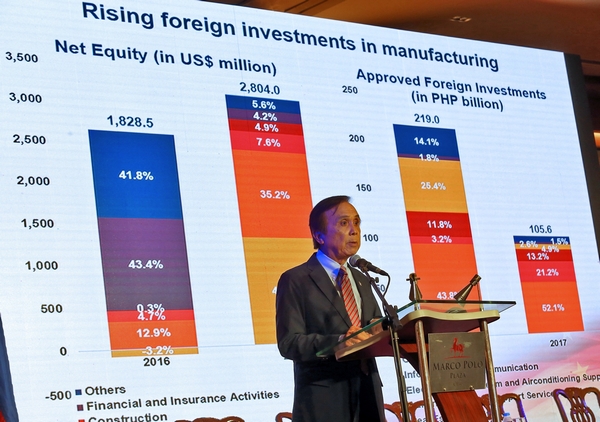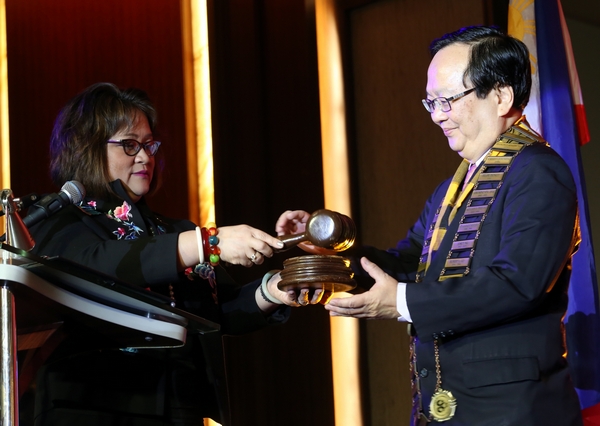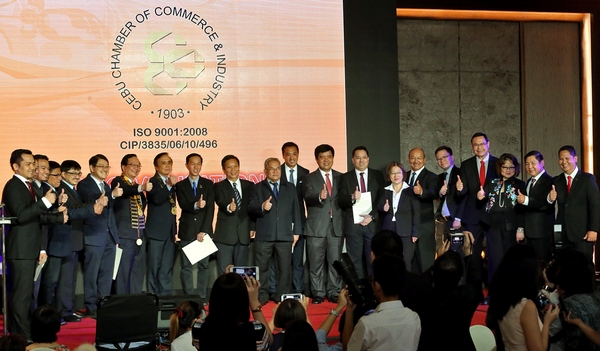Neda chief: Time for bizmen to invest, consumers to spend Infra programs expected to continue spur country’s economic growth

Secretary Ernesto Pernia paints a rosy picture of the economy, citing the government’s infrastructure programs as one of the factors to usher in a golden age. Pernia was one of the speakers on Thursday’s Cebu leg of the Philippine Economic Briefing at the Marco Polo Plaza. CDN PHOTO/JUNJIE MENDOZA
More infrastructure programs and social protection initiatives are seen to sustain the Philippine’s upward economic growth.
National Economic Development and Development Authority (NEDA) Secretary Ernesto Pernia, in yesterday’s third leg of the Philippine Economic Briefing (PEB) in Cebu, explained that these two major thrusts of the current administration will propel the country as among the fastest growing economies in Southeast Asia.
“The Philippine economy has entered the golden age. Our economy has been performing its best ever over the past nearly five decades. And we may not have seen the very best yet,” Pernia said in his presentation on the 2017 Philippine economic performance.
“Now is the time for businessmen to invest and for consumers to spend before global interest rates go up,” he added.
In 2017, the top NEDA official pointed out that the country registered a 6.7 percent full year gross domestic product (GDP) growth.
While this is a bit lower than the 6.9 percent in 2016, Pernia said the Philippines remains to be one of the fastest growing economies in Asia next to China’s 6.9 percent and Vietnam’s 6.8 percent growth.
Growth drivers for this, according to Pernia, include rising government spending, private sector investments, exports, and household consumption on the demand side. On the hand, for the supply side, drivers include agriculture and industry as well as the resurgence of manufacturing.
Pernia also said that there needs to be key policy reform agenda in order to sustain or even accelerate the country’s economic growth.
These include improving government processes in dealing with business; easing restrictions on foreign investments; pursuing tax reform towards a simple, fair, and equitable tax system to boost consumption spending and investments; and accelerate infrastructure development, among others.

NEW CCCI LEADERS. Melanie Ng,outgoing Cebu Chamber of Commerce and Industry (CCCI) president (above,left), turns over the gavel to the incoming president, Antonio Chiu, during Thursday’s CCCI general membership meeting at the Marco Polo Plaza hotel. At right, the CCCI’s new board of directors give the thumbs up sign after they were sworn in to their new posts by Secretary Ernesto Pernia (seventh from left) of the National Economic Development Authority.
CDN PHOTO/JUNJIE MENDOZA)
Infra dev’t
Aside from NEDA’s Pernia, senior officials from other major economic agencies of government also presented initiatives to hit the goal of a 7 to 8 percent annual GDP growth until 2022; and the reduction of poverty rate from 21.6 percent in 2015 to a target of 14 percent in 2022.
Major road and transportation projects all over the country including in Cebu and the rest of the Visayas were also presented.
“Our infrastructure investments, estimated at 170 million US dollars between now and 2022, have very high multiplier effects. By undertaking these thoroughly studied strategic projects, we will stimulate economic activity. Jobs and opportunities will be created, and we are confident we can bring down poverty incidence to only 14 percent by 2022,” said Finance Secretary Carlos Dominguez in a speech which was delivered by Undersecretary Bayani Agabin.
With these, he said the country can achieve its growth target of 7 percent for this year or even better.
In order to fund the government’s ambitious infrastructure projects’ spending, Dominguez said the comprehensive tax reform program will help them create incremental revenues to do so.
At the same time, the program is helped by grants and concessional loans extended in the form of official development assistance from other countries in the region as well as support from multilateral institutions like the Asian Development Bank (ADB), World Bank (WB), and the Asian Infrastructure Investment Bank (AIDB).
Department of Transportation (DOTr) Assistant Secretary Mark Steven Pastor cited their big-ticket project in Visayas including the Mactan Cebu International Airport (MCIA) Terminal 2 which is opening in June, and the New Panglao Airport in Bohol which is already 80 percent complete as of March.
For his part, Department of Public Works and Highways (DPWH) Director Constante Llanes Jr. also presented a list of road projects as well as high-impact bridges that will connect the Visayas islands as well as connect Visayas to Luzon.
Among these projects are the Bohol-Leyte Link Bridge, Cebu-Bohol Link Bridge, Leyte-Surigao Link Bridge, and the Luzon-Samar Link Bridge.
Department of Finance (DOF) Director Euvimil Nina Asuncion also presented highlights of the tax reform program which will help fund the government’s development agenda. Of the proceeds of Package 1 of the Tax Reform for Acceleration and Inclusion (TRAIN), she said 70 percent is earmarked for infrastructure projects while 30 percent are for social protection programs.

CCCI INDUCTION OF OFFICERS/APRIL 19, 2018: NEDA secretary Ernesto M. Pernia (8th from left) with the new board of trustees of Cebu Chamber of Commerce and Industry headed by their new president president Antonio Chiu (7th from left) show their tumbs up after taking their oath of office during the CCCI general assembly and turn over ceremony and induction of new officers in Marco Polo Plaza hotel.(CDN PHOTO/JUNJIE MENDOZA)
For his part, Department of Budget and Management (DBM) Director Rolando Toledo, said the execution of massive transportation projects and road projects is made possible by budget reforms, including on-time disbursements.
Of the P3.767 trillion national budget for 2018, by expense class, the government has earmarked P980.1 billion for infrastructure and other capital outlays. By sector allocation, social services account for P1.4 trillion of this year’s budget.
Meanwhile, Bangko Sentral ng Pilipinas (BSP) Deputy Governor Chuchi Fonacier reiterated the BSP’s commitment to price and financial stability which will help make economic growth sustainable.
She also presented the BSP’s financial sector reforms which complement the government’s inclusive growth agenda.
The Cebu leg of the PEB followed the one held in Davao last March 9 and the other one in Clark last April 13.
Disclaimer: The comments uploaded on this site do not necessarily represent or reflect the views of management and owner of Cebudailynews. We reserve the right to exclude comments that we deem to be inconsistent with our editorial standards.
